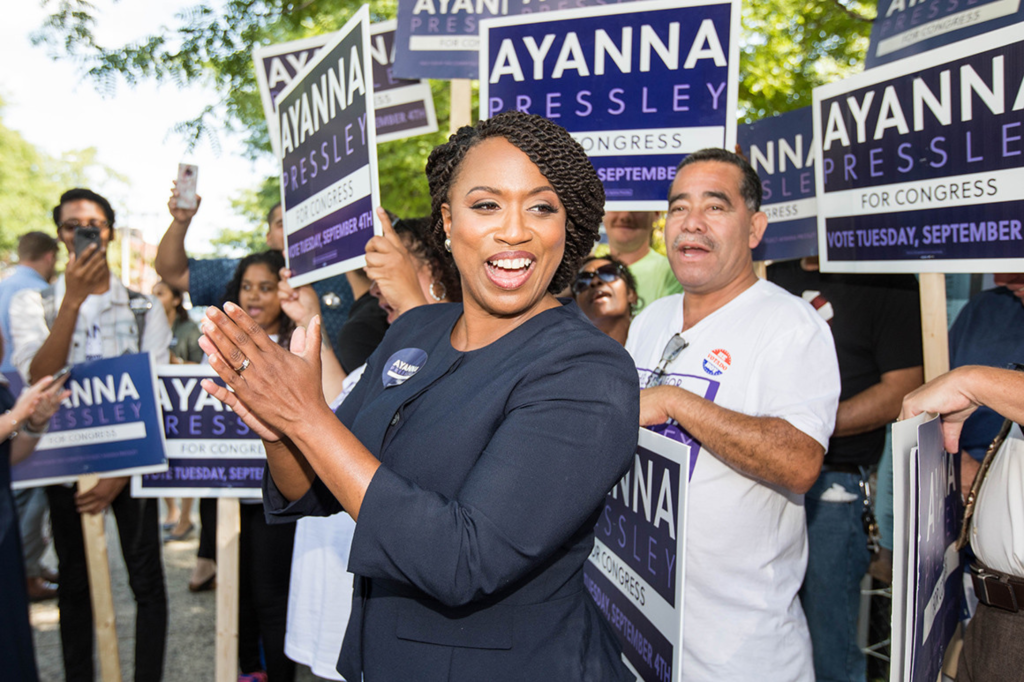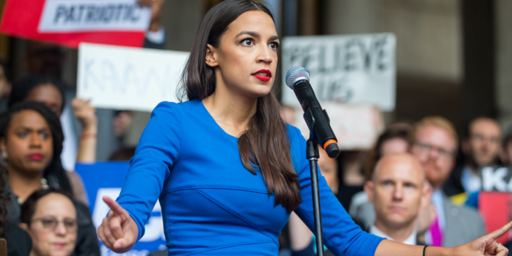Veteran Democratic Congressman Defeated By Boston ‘Progressive” Ayanna Pressley
Another "progressive" victory over a longtime Democratic incumbent, but this one is a bit different.

The 2018 primary season is almost over, but that doesn’t mean there aren’t still some political surprises out there. One of the most notable such surprises, of course, came in June when 28-year-old Alexandria Ocasio-Cortez, a self-described “socialist” beat Congressman Joe Crowley who had been in Congress since 1998 and was seen by many as a potential successor to Nancy Pelosi in Democratic leadership. Last night saw the same sort of surprise when Ayanna Pressley, a self-described progressive, defeated Michael Capuano, who had served since 1998 in a House seat that can trace its lineage back to the likes of Tip O’Neill and President John F. Kennedy:
BOSTON — Ayanna Pressley upended the Massachusetts political order on Tuesday, scoring a stunning upset of 10-term Representative Michael Capuano and positioning herself to become the first African-American woman to represent the state in Congress.
Ms. Pressley’s triumph was in sync with a restless political climate that has fueled victories for underdogs, women and minorities elsewhere this election season, and it delivered another stark message to the Democratic establishment that newcomers on the insurgent left were unwilling to wait their turn. Ms. Pressley propelled her candidacy with urgency, arguing that in the age of Trump, “change can’t wait.”
Her victory carried echoes of the surprise win in June by Alexandria Ocasio-Cortez, who trounced a longtime House incumbent, Joseph Crowley, in New York. Ms. Pressley is also among several African-American progressives who beat expectations, and in some cases performed far better than polling projections; they include Stacey Abrams of Georgia, Andrew Gillum of Florida and Ben Jealous of Maryland, who each won the Democratic Party’s nominations for governor.
There is no Republican on the November ballot in this storied Boston-based district, which was once represented by John F. Kennedy and is one of the most left leaning in the country.
Addressing jubilant supporters at a union hall in Dorchester Tuesday night, Ms. Pressley said: “It seems like change is on the way.”
Speaking in abnormally hushed tones, in contrast to her fiery and impassioned style on the campaign trail, she told supporters “we have together ushered in something incredible.”
“People who feel seen and heard for the first time in their lives, a stakehold in democracy and a promise for our future,” she said. “That is the real victory, that is bigger than any electoral victory. And I want to thank you all for being foot soldiers in this movement and for ushering in this change.”
Mr. Capuano conceded with barely 13 percent of the votes counted, saying: “I’m sorry it didn’t work out, but this is life, and this is O.K. America’s going to be O.K. Ayanna Pressley is going to be a good congresswoman, and I will tell you that Massachusetts will be well served.” Soon afterward, The Associated Press pronounced Ms. Pressley the winner.
Ms. Pressley, who in 2009 became the first black woman elected to the Boston City Council, overcame a powerful lineup of the Massachusetts political establishment. Mr. Capuano, 66, who has held the seat for 20 years, was endorsed by almost every major political figure, including Mayor Martin J. Walsh of Boston, who deployed his extensive political machine on Tuesday on Mr. Capuano’s behalf.
“This is a big wake-up call to any incumbent on the ballot in November,” said Mary Anne Marsh, a Boston-based Democratic strategist. “We’ve been in a change election cycle for years. But Trump may have opened the door for all these young candidates, women, people of color, because voters want the antithesis of him.”
Ms. Pressley’s win, the margin of victory, and the historic nature of her candidacy are sure to reverberate throughout Boston, a city whose fraught racial history is baked into its national reputation. Ms. Pressley said Democrats throughout the state discouraged her from running against Mr. Capuano, and John Lewis, the civil rights legend and longtime Georgia congressman, held a campaign event for him in May. Yet Ms. Pressley rode a strong turnout among Boston’s minority communities toward history.
Her slogan, “change can’t wait,” was a nod to those who said her candidacy was disrupting the traditional order of Boston politics, she said. It was also a rallying cry for the state’s only minority-majority district — that it should have a representative who mirrors the community’s diversity.
Political observers said the win was the biggest sign yet that a “new Boston” was emerging in the shadow of the city’s historically white, union-driven political establishment. This new electorate is powered by minorities, immigrants and young college students who have flocked to the city’s start-ups and tech-friendly industries.
“It felt like a good time to give someone who’s not a white male a shot,” said Linus Falck-Ytter, 26, a software developer, after voting in Cambridge. “And I liked that she’s more outspoken about helping underrepresented communities.”
More from Politico:
The progressive left crowned its latest star Tuesday, as Ayanna Pressley upended Massachusetts politics and toppled 10-term Democratic Rep. Mike Capuano in a primary.
Pressley, the first woman of color to win a seat on Boston’s city council, is now set to reprise the same feat in Massachusetts’ congressional delegation — part of a wave of young, female and non-white Democrats reshaping their party in the era of President Donald Trump.
Capuano conceded about 90 minutes after the polls closed Tuesday night, with early results showing him trailing Pressley.
“This is a fight for the soul of our party, and the future of our democracy, at a time when our country is at a crossroads, the Massachusetts 7th is at a crossroads,” Pressley told reporters after voting on Tuesday.
Pressley acknowledged there was little daylight between her and Capuano on policy, though she differentiated herself on the fate of the U.S. Immigration and Customs Enforcement agency and by not accepting corporate PAC money. But most of all, Pressley offered voters a different style of leadership, leaning heavily on her experiences as a black woman, casting her candidacy as a vote for change in a “fight for the soul of the Democratic Party.”
“These times require bold, activist leadership. Someone that will coalition build and movement build,” Pressley told volunteers at an election night-eve rally at her campaign headquarters in Jamaica Plain.
Pressley’s profile was tailor-made for a moment that has rocketed diverse candidates through Democratic primaries, from Alexandria Ocasio-Cortez’s New York upset over Rep. Joe Crowley to Andrew Gillum’s electrifying underdog victory in Florida’s gubernatorial primaries last week.
A 44-year-old black woman, Pressley was seeking to unseat an older, white congressman in Massachusetts’ lone majority-minority district, a Democratic stronghold.
“Conventional political wisdom has been flipped on its head,” said Dave Jacobson, a Democratic strategist. “The old campaign playbook is dead, buried six feet under.”
While many people will attempt to draw an analogy between Alexandria Ocasio-Cortez and Pressley, the analogy can only be taken so far. The most notable difference, of course, is the fact that Pressley is nearly two decades older than Ocasio-Cortez and had far more experience in Massachusetts politics than Ocasio-Cortez did in New York when she took on the seemingly impossible task of running against Crowley. In addition to having served as a member of Boston’s City Council since 2008, Pressley had served as an aide to both former Senator John Kerry and former Congressman Joseph Kennedy II and was far more of a Boston political insider than Ocasio-Cortez. Additionally, unlike Crowley, who had virtually ignored the campaign until the closing weeks of the primary battle, Capuano was an aggressive campaigner in the district, campaigning both his experience and his progressive credentials. More importantly, Capuano recognized the challenge that Pressley represented from the time she got into the race, spent nearly $2 million on the race (which is high for a House District), and took Pressley seriously from the beginning. Despite all of that, Capuano’s advantages and his aggressive campaign could not overcome the public’s apparent demand for change even in a deeply blue district in Boston. Yet for all their differences, Pressley capitalized on Ocasio-Cortez’s narrative, turning her early-summer endorsement into a surge in donors, online traffic and broader interest in her candidacy.
Despite the differences between the two races, it seems clear that there was at least some connection between Pressley’s victory last night and Ocasio-Cortez’s win earlier this year. Pressley herself has said that the endorsement she received from the New York candidate provided a much-needed boost to her campaign, and Capuano stated that he didn’t feel that the pressure in the race was rising and receiving national attention until after Ocasio-Cortez’s win and the parallels that many in the media drew between the two candidates, as imperfect as they may have been.
Ella Nielsen at Vox delves into the meaning of Pressley’s win:
The 44-year-old Pressley’s challenge to Capuano, himself a longtime progressive Democrat, sent a resounding sign that the voters in the Seventh Congressional District — a liberal area encompassing parts of Boston and Cambridge — were ready for a change.
Unlike other races around the state, Pressley wasn’t exactly running against a centrist Democrat. Capuano has burnished his liberal record for years; he voted against the Iraq War, supports Medicare-for-all, and is a member of the House Congressional Progressive Caucus.
The Boston City Council member’s campaign had national progressive groups excited that she could be the next Alexandria Ocasio-Cortez, but she’s not an outsider in Massachusetts politics. Pressley served as a senior aide to former Sen. John Kerry and interned for former Sen. Ted Kennedy’s office. She’s arguing that she will shake up Washington, DC, and is running on Medicare-for-all and a litany of other progressive issues.
But Pressley wasn’t just running on a progressive message, she was arguing that her own experience as a person of color made her more qualified to represent the district than an older white man — no matter how liberal. People of color make up the majority of the Seventh Congressional District’s residents, but as local public radio station WBUR noted, white people make up the majority of the voters there.
One of the few policy differences between Capuano and Pressley was a so-called “Blue Lives Matter” bill, which would make assaulting a police officer a federal crime. Capuano and the rest of the Massachusetts Congressional delegation voted for the House version of the bill, a decision Pressley criticized.
Her victory adds to a growing list of victories for candidates of color across the nation. Last week, Tallahassee Mayor Andrew Gillum pulled off an upset in Florida’s Democratic nomination for governor. In doing so, he made history; Gillum is Florida’s first African-American gubernatorial nominee.
Pressley’s win adds to an exciting moment for progressive groups, but also for black Democrats. The Democratic nominee for Georgia governor, Stacey Abrams, could make history as the nation’s first African-American woman governor if she wins. Other women of color, including Lauren Underwood in Illinois, Jahana Hayes in Connecticut, Ilhan Omar in Minnesota, and Lucy McBath in Georgia are the nominees for their respective congressional districts.
Much like the district that Ocasio-Cortez won in June, Pressley is running in a district that is about as solidly blue as you can get. As I noted, while the district itself has changed somewhat in composition and in its numerical designation over time, it generally can trace its lineage back to the likes of Kennedy and O’Neill and was last represented by a Republican in the early part of the 20th Century, falling into Democratic hands in the 1932 Congressional elections and remaining there ever since. Indeed, Republicans aren’t even bothering to put up a candidate in the race this year, so Pressley basically has a clear ticket to Washington in January. Given this, Democrats, Republicans, and the national media should be cautious in trying to draw too many conclusions from what happened there last night. Not only is this the case because Capuano is as much a progressive as Pressley but because it’s not clear that it really tells us much about what direction the nation as a whole is taking. While a platform like the one Ocasio-Cortez and Pressley ran on may succeed in their respective districts, it’s unlikely to succeed in the toss-up districts that Democrats will need to win to take control of the House in the fall. Pressley won as much because the voters in her district were ready for change as she did because of her political position. Put her in the middle of Indiana and you most likely would not see the same result. Democrats hoping to win in November need to realize that and to accept that they will need to welcome some of those “Blue Dog” Democrats back into the party if they’re going to take Congress back. If they don’t, they’ll end up in much the same state Republicans find themselves even if they do manage to win control of the House.





Small point: Pressley served as an aide to Sen. Kerry, not Kennedy.
@CSK:
The linked articles and other sources say that she had also served as an aide to Congressman Kennedy. Is this incorrect?
@Doug Mataconis: In the article, you said she served both Congressman Joseph Kennedy and JFK (which would have been a neat trick). “Pressley had served as an aide to both former Senator John Kennedy and former Congressman Joseph Kennedy II…” Just a typo.
Got one actual quibble though. In the intro you claim that Occasio-Cortez “was seen by many as a potential successor to Nancy Pelosi in Democratic leadership. ” Who on earth saw her that way? Anyone other than the rabid-trumpistas trying to portray her and the Democrats in general as whacked out crazies?
Crowley, who she defeated, was seen as a Pelosi successor. Did you get them switched?
@SKI:
I’m reading the sentence in question and it seems clear that I was referring to Crowley, but I removed the comma to make it clear that this is the case.
@Doug Mataconis: That makes more sense. Thanks for clarifying.
And if my grandmother had wheels she’d be a wagon…of course Pressley wouldn’t do well in a conservative district, much like someone like Trey Gowdy wouldn’t do well in the district Pressley just won…all majorities need a coalition…I’m sure Democrats realize that…
Pressley won because the voters wanted someone who was closer to them. You can read closer as in age, race, economically, or place of residence. Or more than likely some combination of the 3, her being a woman did not hurt either.
As for blue dog democrats, that mythical creature has been extinct since 1980.
Pressley is a Justice Democrat. If you want to know what makes her different you might try looking at the website.
@OzarkHillbilly:
Exactly what I was thinking. This isn’t an insurgency candidate or an ideological challenge to either the former representative or the Democratic Party as a whole. It’s voters doing what they ought to do: choosing the candidate they feel is best in touch with their concerns and most able to address the issues that concern them.
Wow, maybe the demographic shift is happening and the moderate corporate Clintonista sellout boomers (read:most of you neo libs) are finally facing the challenge of the 70% who are one paycheck away from being on the streets, who are fed up with the Hillary wing of entitled Wall Streeters and for whom global capitalism has exacted a heavy toll.
The fact is Democratic socialism was the main reason the New Deal and the Dems easily destroyed the greedy, Wall Street country club GOPers for 6 decades, then along came Sam Nunn, the grifter couple from Arkansas, Dick Gephardt, Evan Bayh and the other neocon leaning DLC turncoats of the “the era of big gov’t is dead except for bloated Pentagon spending and endless wars.”
During this “lets pretend we are really just middle of the road Republicans”, the Dems lost two thirds of the Governorships, 60% of state legislatures, the House, the Senate, the Oval Office and the SCOTUS.
Sooooooo, what is there left to lose? We tried following all you Hillary slurpers and what did it get us but catastrophic defeat at the hands of a lunatic when we all know Bernie would be President right now as he led all polls vis-a-vis Trump.
Now all you latte sipping boomers are about to be cast aside and thank God for that. Its amazing how the greatest income inequality, the most accumulation of wealth, the shredding of anti trust laws and the willingness to kowtow to the military and security state has all happened under the watch of the boomers. Now the young ones are in revolt. They have no affection for out of touch leaders twice or three times their age, unless they are DSOCs.
I got flamed here numerously as I pointed out the total failure of the Hillary Dems, and now will have the last laugh as the neolib boomers are hopefully retired – and good riddance.
At least if we lose to the wingnuts, it won’t be over watered down moderate corporate policies that seek to be a Republican Lite version of their opposition.
We will fall on our sword over true reform not and not over the corporate Reaganite positions catering to top Dem contributors.
Medicare for all
Abolish ICE
No bail system
Income “redistribition”- 80% tax rate on the working people
Sounds like the Democratic leadership is in a time warp back to 1972
Yeah, Tyrell, back to 1972, you remember, when wages doubled for the working class from 1948 (at the present rate it will literally take 4,000 years for wages to double based on the .0025% per year rate currently)….when there was Glass Steagall and hardly any financial shenanigans by banksters and Wall Street grifters imperiling pensions (remember them?) and life savings…yeah, back then when all the Communists of my generation (Nixon for example) actually debated a national income stipend in the election that year…yes, 1972 when a trip to the hospital wouldn’t bankrupt you. Yes, 1972 when “tuition” to attend and graduate from UC Berkeley would cost a student all of $1,400 total for the FOUR years.
Yeah, the hellhole dystopian nightmare of a nation that Father Ronald of Reaganus delivered us from in 1980.
Its sad that an almost 90 year old is waaaay more liberal than the younger generation of boomer sellouts who see the present day as much more advantageous to the poor and middle.
Maybe the Xers and Millennials are tired of the boomer bullshcite and are voting to end it. Yippee ki yay to that.
I realize you may be a bot or a troll or whatever, but who the f@ck is arguing for an 80% tax rate on working people…
@An Interested Party:
No one, of course. Thomas Picketty, a French economist, recommended a tax rate of 80% on the highest earners (the top 1%). Apparently Tyrell is under the impression that “workers” are the top 1% of income earners.